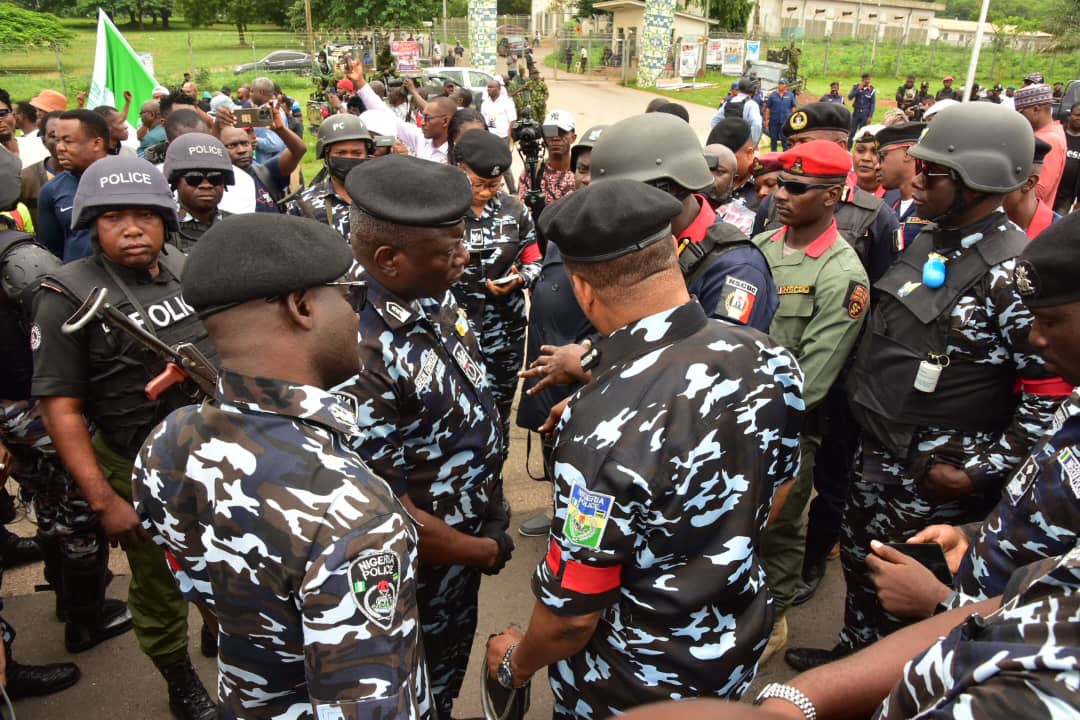A few letters on what the protests were, and weren’t
As has become custom whenever I write on a controversial topic, I received a torrent of messages. A reader even called me, despite the fact that it says clearly up at the column’s title that ‘SMS only’. First of all, a wide swathe of the media kept referring to the protests, erroneously, as ‘hunger protest’. […]

protests 26
As has become custom whenever I write on a controversial topic, I received a torrent of messages. A reader even called me, despite the fact that it says clearly up at the column’s title that ‘SMS only’. First of all, a wide swathe of the media kept referring to the protests, erroneously, as ‘hunger protest’. I say erroneously, because such a phrase does not exist, and must have been borne out of confusion between naming it a hunger strike (which is a completely different animal) and protest against hunger, the generally-agreed-upon colloquial term describing the hardship currently being experienced widely in Nigeria. Another way to look at it is that a new ‘Nigerianism’ has been coined, as always, out of necessity. Now, back to my readers who felt strongly enough about my article to write in, for better or worse, I thank you. Herewith, and in no particular order, are the responses. – Abdulkareem.
How lack of education transformed protests to riots
Assalamu alaikum, I read your article on page 17 of Weekend Trust of 10, August 2024. It is an honest opinion and beautiful analysis. However, how do you expect a peaceful protest in the North under the current circumstances ? Most of the protesters are among the millions of northerners who our leaders failed to give one of the basic needs of human beings: education. If we had educated them, they wouldn’t riot but protest. The millions of out-of-school youth are from the North. Just see the huge waste of Human Resources! They are now easy recruits for thieves, robbers, bandits, and Boko Haram.
I am from the North-east, and was sent to school by an uncle against my father’s wish. Alhamdulillah, I was educated from primary school to MSc in Engineering in the UK, all at government’s expenses and retired as a director in the federal service. Why am I saying all these? Simply by the grace of Allah, education has impacted positively in my life while my childhood friends back home, unfortunately, are wallowing in poverty and ignorance.
So unless we prioritise and fix education, be honest and prudent in managing our scarce resources, anytime we call for protest in the North, it becomes a riot. And while the rest of the country moves forward, we move backwards. I pity those young men and women. Our leaders have denied them something essential in their lives.
Need for transparency, integrity among police officers
In search of greener pasture, many Nigerians sleep in cars, abandoned buildings in Abuja
And Allah says in the Qur’an: Surely Allah will not change a people unless they change what is within them (their character and attitudes.) Allah Ya sa mu dace. Aamin.
Bala DanShehu (location unspecified)
Journalism should be non-partisan
I am a regular reader of your column. I am writing to express my concern regarding your last column. While I appreciate the role of the press in scrutinising government actions, I find this particular critique to be overly partisan. It presents a one-sided view of the recent protests against economic hardship, focusing primarily on criticisms of the government’s response while neglecting to acknowledge the broader context and complexity of the situation. By emphasising only the shortcomings of the government’s approach, the article overlooks the significant challenges that policymakers face in addressing multifaceted economic problems. Economic recovery is seldom straightforward, and while there are legitimate concerns about the effectiveness of current measures, it is unfair to ignore the substantial efforts and resources that have been allocated to mitigate the situation. The government’s response, while not perfect, should be viewed within the broader context of ongoing efforts and the constraints within which it operates. Constructive criticism is essential for democracy, but it must be balanced. Thank you for considering my perspective, and I look forward to seeing more balanced and insightful reporting on this critical issue, even though your newspaper always toes political lines.
Jimi Adegbenga, Abuja.
Hitting the nail on the proverbial head
Dear sir, I am writing to commend you for your insightful and balanced op-ed piece, “Life in Asiwaju’s house of commotion,” published last week. Your analysis of the recent protests against economic hardship, as well as auxiliary issues, was both thoughtful and thorough, providing a much-needed perspective on the complexities of the situation. Your ability to highlight the multifaceted nature of the economic issues while also recognising the genuine frustrations of those affected demonstrates a deep understanding of the topic. I particularly enjoyed your focus on the ordinary Nigerian, and I nearly shed a tear for the young woman in the video you described. I have always enjoyed reading you, as your output is regularly a valuable resource for readers like myself. God bless.
Jaleel Momoh, Lokoja.
Postscript: While it seems like the protests or the attendant drama have all fizzled out, the issue remains: People are suffering, and the economy continues to worsen. I have seen the police and even the NSA’s office reveal that external forces were allegedly ‘sponsoring the protests’ and I would be very happy to see those elements get their just desserts. However, everyone – government officials included – should not forget that there is still hunger in the land, and it needs to be addressed before we begin to eat ourselves. Figuratively speaking, of course.
